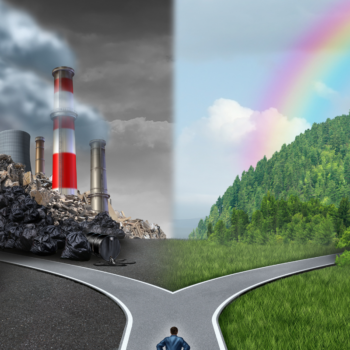Michael Moore’s web-released film ‘Planet of the Humans’ has faced outrage from the environmental community for months now. The documentary criticized the green energy movement, and many feel it was doused with misinformation. Yet, I think it can still teach us something.
Busy? Try the speed read.
What to know Michael Moore’s ‘Planet of the Humans’
criticizes the green energy movement. Moore faced outrage from the
environmental community. The movie re-released on YouTube back in June
after a copyright infringement.
The film’s argument ‘Planet of the Humans’ argues that
- Green energy does not have the capability to save the planet from a climate crisis.
- Leading environmental organizations’ motives are muddied by ties to the fossil fuel industry.
The critics Environmentalist Josh Fox and others
rebuked the film for its inaccuracies. Most of the footage dates back
5-15 years ago, and information about solar and wind technology
references that time period. Despite this, the footage misleadingly
omits dates.
Zoom out It is true that green energy technology can
be poorly implemented, but this does not mean that green energy as a
whole is useless, as the film suggests. In the words of Fox, “to attack
the basic premise that renewable energy works is patently absurd.”
Dig deeper → 4 min
Breaking down Planet of the Humans
The movie came out on April 21st. YouTube removed the documentary following a copyright infringement claim by environmental photographer Toby Smith. Moore re-uploaded the video on June 5th.
The film has two main arguments.
- Green energy does not have nearly the power to save the planet from a climate crisis.
- Leading environmental organizations and activists support certain types of energy, such as biomass and natural gas, because their motives are corrupted by corporations tied to fossil fuel production.
In the words of the film’s writer and director, Jeff Gibbs, “renewable energy represents a massive expansion of a toxic, planet-wrecking, fossil-fuel-dependent industrial civilization, NOT a replacement for it.”
It is easy to see why so many environmentalists responded negatively to such a message.
Josh Fox, activist and documentary film director, told The Hill, “renewable energy, wind and solar represent the way that we can reduce carbon in our atmosphere, so to attack the basic premise that renewable energy works is patently absurd.”
Biomass(ive) Misinformation
Josh Fox and other environmental scientists are right to take issue with much of the movie’s content. The film references inefficient solar panels from over a decade ago to support their claim that solar power does not have the capacity to meet energy needs, not taking into account wild technological improvements made since then.
Most of the footage dates back 5-15 years ago, and information about solar and wind technology references that time period. Despite this oversight, the footage misleadingly omits dates.
The film also heavily criticizes Bill McKibben of 350.org, an organization dedicated to addressing the climate crisis with solutions like renewable energy. The movie suggests that McKibben, the organization’s founder, supported biomass, which contributes to deforestation.
In fact, McKibben openly condemned biomass in a 2016 op-ed.
According to a response from Jeff Gibbs, the creators of the film were aware of this but felt that McKibben sent “mixed messages” on the issue, because he didn’t openly condemn existing biomass plants and later supported a few projects that included some biomass. Of course, the film itself fails to cover this more recent history.
According to the movie, renewable energy simply is not the answer. But then, what is?
The Danger of Population Control
The film appears to make a dangerous claim that world population growth is the main cause of ecological destruction. It is common knowledge, however, that it is not people who pose a risk to the planet, but rather consumption. The below graph from The Global Footprint Network illustrates this distinction:
A more detailed point-by-point summary and rebuttal of the film is available in Josh Fox’s article for The Nation.
Can We Learn Anything From ‘Planet of the Humans’?
Are renewable energy projects counterproductive if the environmental cost of construction does not account for the amount of renewable energy it can produce?
Carly Roth Tweet
To say the movie is severely flawed in its presentation of green technology would be an understatement. But Moore’s flick might still have a point.
Are renewable energy projects counterproductive if the environmental cost of construction does not account for the amount of renewable energy it can produce?
Ties to fossil fuels
The film criticizes environmental organizations for accepting donations from the fossil fuel industry.
For instance, the Sierra Club accepted over $25 million from the gas industry between 2007 and 2010. According to the movie, links like these between environmental groups and the fossil fuel industry can lead to ill-advised ‘green’ energy projects.
For example, the film presents the closure of a coal plant in Nevada, only to be replaced by two natural gas plants. In another instance, the movie shows an old solar farm that, while taking up a substantial amount of space, only powers ten houses. Mistakes like these can be especially harmful if inefficient plants are located on valuable natural lands.
Closing thoughts
There is no need to decry clean energy tech as a whole to see that. With scientific evidence that renewable energy sources have a much lower carbon footprint than fossil fuels, the question should be how to effectively implement this technology–not whether to implement it at all.
Moore’s discussion should exemplify ways we can make intelligent decisions where and how green power should be implemented. Finger-pointing solves nothing.
How can we prevent big money from blurring those decisions?













No Comments